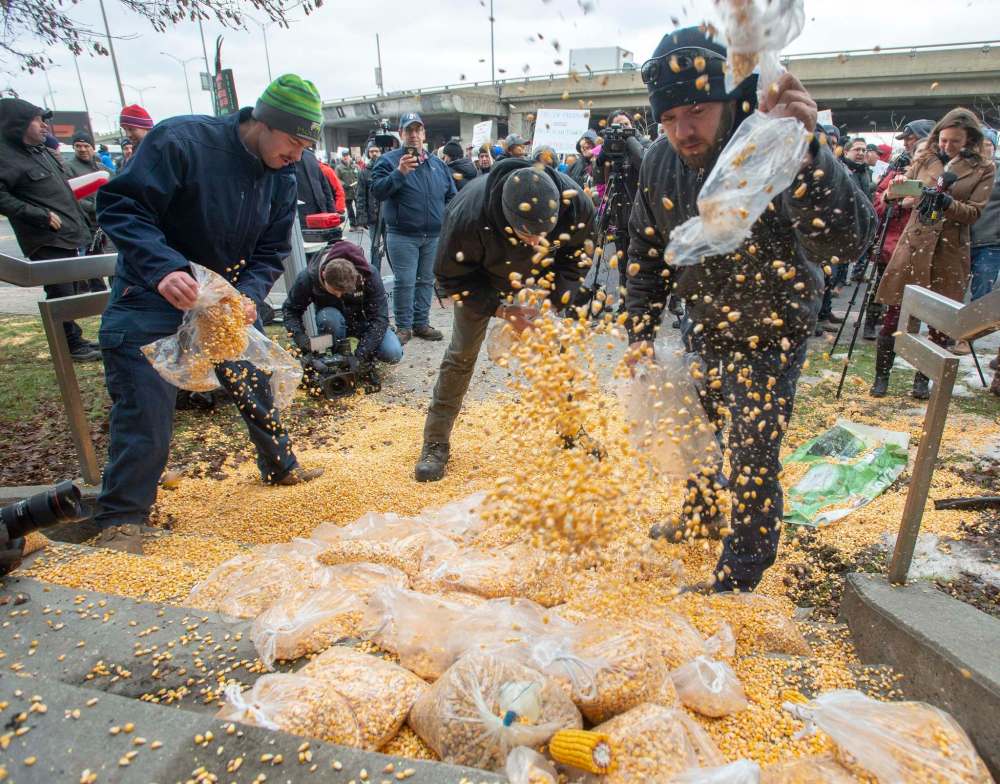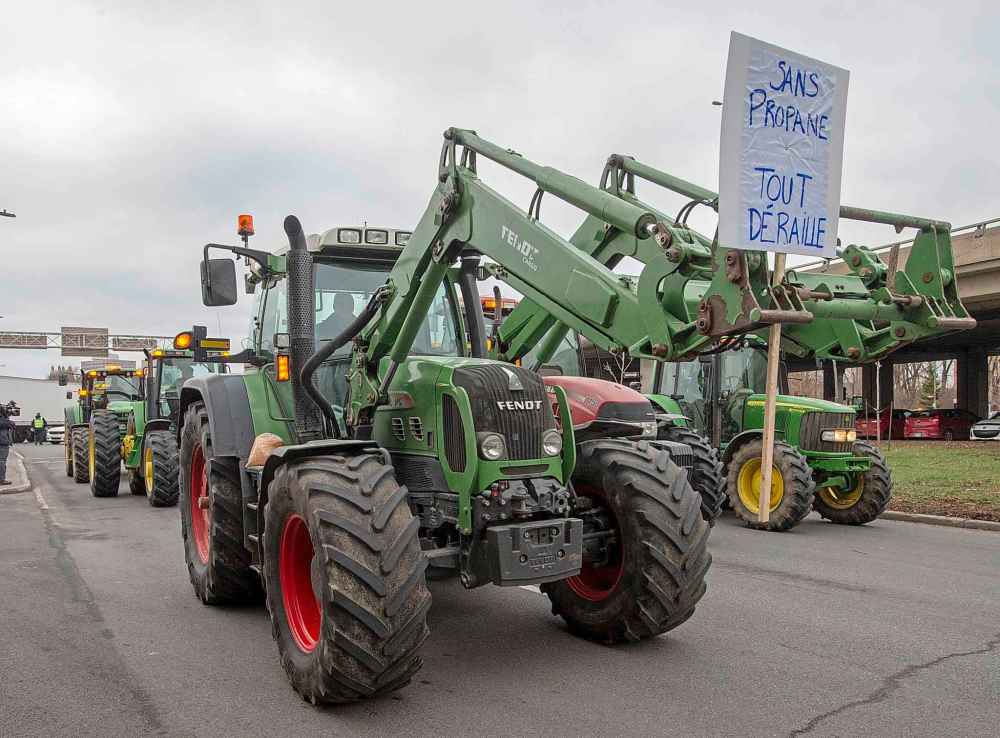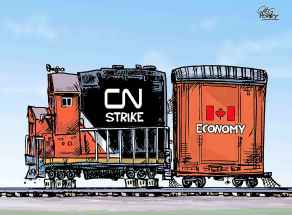CN strike costing grain producers millions Rail-reliant businesses starting to lay off workers
Read this article for free:
or
Already have an account? Log in here »
To continue reading, please subscribe:
Monthly Digital Subscription
$0 for the first 4 weeks*
- Enjoy unlimited reading on winnipegfreepress.com
- Read the E-Edition, our digital replica newspaper
- Access News Break, our award-winning app
- Play interactive puzzles
*No charge for 4 weeks then price increases to the regular rate of $19.00 plus GST every four weeks. Offer available to new and qualified returning subscribers only. Cancel any time.
Monthly Digital Subscription
$4.75/week*
- Enjoy unlimited reading on winnipegfreepress.com
- Read the E-Edition, our digital replica newspaper
- Access News Break, our award-winning app
- Play interactive puzzles
*Billed as $19 plus GST every four weeks. Cancel any time.
To continue reading, please subscribe:
Add Free Press access to your Brandon Sun subscription for only an additional
$1 for the first 4 weeks*
*Your next subscription payment will increase by $1.00 and you will be charged $16.99 plus GST for four weeks. After four weeks, your payment will increase to $23.99 plus GST every four weeks.
Read unlimited articles for free today:
or
Already have an account? Log in here »
Hey there, time traveller!
This article was published 25/11/2019 (2208 days ago), so information in it may no longer be current.
As the strike by about 3,200 conductors and railyard operators at Canadian National Railway entered its seventh day on Monday, Quebec farmers were marching in the streets of Montreal, 550 Saskatchewan potash workers will be forced to go on temporary layoffs and chemical manufacturers are halting production.
Meanwhile, Western Canada’s grain industry is frustrated over being at the mercy of labour negotiations after already having faced a wet and challenging harvest thanks to an early October snowstorm.

Bill Campbell, the president of Keystone Agricultural Producers, said he has not yet heard of producers being unable to haul grain to an elevator but it is only a matter of time before that happens.
“I’m pretty sure a majority of grain has gone into on-farm storage in less than ideal conditions,” Campbell said.
Further along the supply chain, shippers are already experiencing a significant financial hit.
“It is fair to characterize that the members of (Western Grain Elevator Association) are currently incurring costs in the tens of millions of dollars per week,” said WGEA’s executive director Wade Sobkowich.
For the week that ended Nov. 5, CN shipped 5,908 cars representing 533,000 tonnes of grain.
“That is how many tonnes of grain that did not move last week,” Sobkowich said. “It is really bad out there.”
WGEA’s members — Cargill Limited, Louis Dreyfus Company, Parrish & Heimbecker, Limited, Paterson GlobalFoods Inc., Richardson International Limited and Viterra Inc. — are all billion-dollar enterprises. But as their role in the supply chain is hampered, it will quickly filter down to the farm gate.

“There is a lot of heartache and concern,” said Campbell, who farms near Minto, south of Brandon. “It just backs everything up. The trains aren’t moving so now there’s vessels waiting for grain from CN deliveries. There is some inventory in place but once that ship is filled what will fill the next one? That is the problem.”
Sobkowich confirmed his members are racking up tens of thousands of dollars of demurrage fees every day as ships wait in harbours for shipments. His organization is asking the federal government to call Parliament back before Dec. 5 and introduce emergency legislation to get CN workers back to work.
“It raises the question of work stoppages on a railway,” Sobkowich said. “If you have a collective bargaining issue between labour and management in a normal commercial environment, that’s one thing. It only puts hurt on for the parties at the table. But when you have a situation where the grain is sitting and waiting to be moved, is that really harming CN, and how badly? They are going to move that grain anyway.”
“Last we week we were worrying about what could happen. Today it is happening. They can’t stretch this out further. Prime Minister Trudeau needs to tell Canadians his plan to end the CN strike. Hoping for a settlement isn’t good enough anymore.”
– Garth Whyte, head of Fertilizer Canada
On Monday, Canada’s largest potash mine announced it will temporarily shut down and lay off 550 employees as a result of the strike.
Fertilizer giant Nutrien Ltd. notified workers Monday that its mine in southeastern Saskatchewan will halt operations for two weeks starting Dec. 2. The vast majority of the Rocanville mine’s product is shipped by CN, which is now operating at 10 per cent capacity.
The announcement comes two days after news broke of 70 short-term layoffs at CN’s auto terminal in the Halifax area due to halted car shipments. More than 250 staff at CN’s Autoport terminal received layoff notices, but the company later rescinded the notices for 180 employees, according to Unifor.
The sense of urgency around the strike’s ripple effects continues to grow. Hundreds of Quebec farmers marched through Montreal streets Monday, alongside a convoy of tractors to dump heaps of corn at the steps of Prime Minister Justin Trudeau’s riding office, calling on Ottawa to resolve the week-long labour stoppage.
Federal Agriculture Minister Marie-Claude Bibeau urged CN and its workers Monday to reach a deal to alleviate the impact on farmers, saying negotiation “would be the best way for every party and the fastest solution.”

”That’s not enough,” said Garth Whyte, head of Fertilizer Canada, in a phone interview.
”Last we week we were worrying about what could happen. Today it is happening. They can’t stretch this out further. Prime Minister Trudeau needs to tell Canadians his plan to end the CN strike. Hoping for a settlement isn’t good enough anymore.”
Workers are receiving layoff notices and chemical companies face shutdowns as the effects of Canada’s largest rail strike in a decade ripples through the economy.
The dispute, over working conditions and benefits, is threatening to hobble Canada’s export industries and stunt its already weakening growth. The strike could shave off almost a quarter-point from growth this quarter if it lasts through Dec. 5, according to Toronto-Dominion Bank economists. That’s when lawmakers, who have the power to break the impasse, return to Parliament.
martin.cash@freepress.mb.ca
– with files from CP and Bloomberg

Martin Cash has been writing a column and business news at the Free Press since 1989. Over those years he’s written through a number of business cycles and the rise and fall (and rise) in fortunes of many local businesses.
Our newsroom depends on a growing audience of readers to power our journalism. If you are not a paid reader, please consider becoming a subscriber.
Our newsroom depends on its audience of readers to power our journalism. Thank you for your support.











